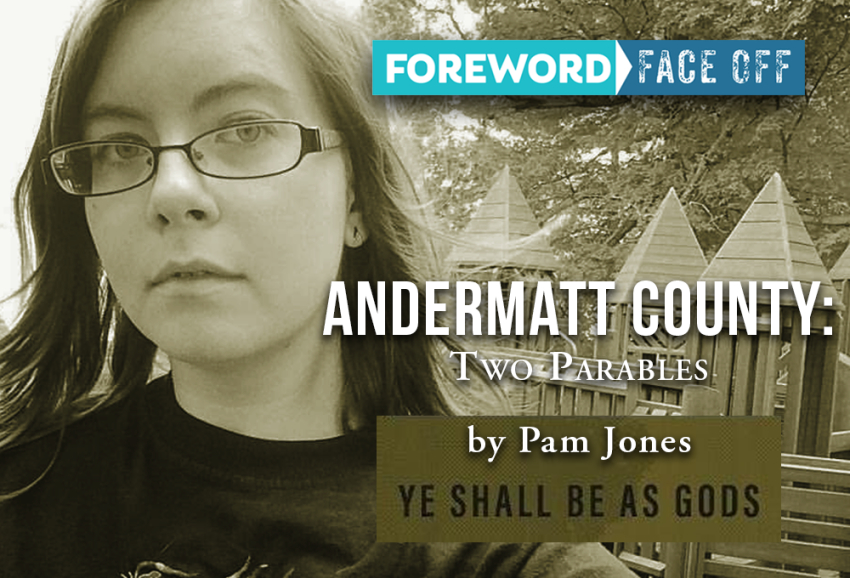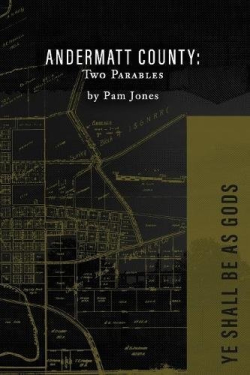Reviewer Michelle Schingler Takes On Pam Jones, Author of Andermatt County

Foreword’s managing editor, Michelle Schingler, is responsible for deciding which books deserve a review in Foreword Reviews. Every issue, she typically whittles a pile of nearly one thousand submissions down to just one hundred and twenty titles. She’s decisive, brutally honest, and doesn’t take herself too seriously. That said, she can be selfish. Every so often, an advance review copy lands on her desk that so impresses her, she won’t let anyone else review it.

Yes, Andermatt County was one of those books. In her glowing review, she writes that author Pam Jones “has a gift for drawing beauty out from brutality, even when it’s of a lopsided and unexpected sort. Her descriptions trade between being winsome and petrifying, and the situations imagined in the course of these two tales will haunt their audiences.”
So, no one at Foreword was surprised when Schingler reached out to Jones for this Face Off interview—a high-minded literary conversation that reveals the wisdom and keen intelligence of a first-rate novelist.
And finally, you can count on these reviewer-author Face Offs every Thursday in Foreword This Week. No, we wouldn’t mind at all if you shared this interview with your book-loving friends.
Andermatt County has a strong Southern Gothic flavor. What was, or is, the draw of that style for you?
I read Flannery O’Connor’s short stories in college and became swept up in the work of Shirley Jackson in the last year. It’s the element of the grotesque that does it for me. It illustrates loneliness, separateness, zealotry with humor, which a character would need to get him/her through, and to get the reader through the story. Also, the grotesque can point out the flaw in a broader situation. The Misfit in O’Connor’s “A Good Man is Hard to Find” is a great example of hypocrisy coming to get those guilty of it, quite literally.
To read both parables in Andermatt, you have to flip the book and turn it. Why this printing method, and where should readers start?
Originally, only one of the stories was going to be published, the one titled “Ye Shall Be As Gods,” as a short novel. “Happy Birthday, Dear Bitsy” was going to appear in April Gloaming’s literary magazine, Waxing & Waning. It was determined that “Bitsy” was too long for the magazine, but a perfect tie-in with “Gods,” since both stories take place in the same universe, at around the same time. When the idea was proposed to publish the two stories together, I suggested that the book start with “Gods” and end with “Bitsy,” so that readers could leave on a high, humorous note. The flip was a surprise to me when I saw the fully edited, formatted manuscript, and I loved the idea.
Bitsy and Emmett live very different lives, but there are characters who appear in both of their stories, so they’re clearly coexisting. Why did you choose—other than perhaps for Bitsy’s safety—to place them in the same book space, but prevent their paths from crossing?
I’m seeing the similarities now that I have the stories side by side, between Emmett and Bitsy. Emmett has, up until his “apprenticeship” under Rex Henry, lived a life met with indifference. His mother and his aunts don’t care that he’s up and left—they don’t even know how old he is. Rex Henry sees him as a tool, again something that he doesn’t invest any feelings into, just purpose. Whereas, Bitsy comes from a loving, albeit straight-laced, family. Her mother wishes Bitsy were something else, something that she can better understand, but she cares enough to recognize that she can’t mold her daughter into something that she will never be, and possibly comes to nurture that difference. Sure, Bitsy has a darkness within her, like Emmett, but with love, it could be channeled into something good. She could become a surgeon—or a writer.
Do you have plans to write additional stories in the Andermatt County universe? If not, what are you working on next?
Yes, I am working on something in the Andermatt universe. It takes place not long after the incidents in “Gods” and “Bitsy,” and involves a World War II refugee, a cult, and exploration of belief.
I don’t think I’m ever really going to leave Andermatt County. David Lynch said something similar about Twin Peaks, about not being ready to completely put it away and call it done. Andermatt County is where thoughts become things and divinity and devilry are manifest only in ourselves, and there is no outside realm to praise or to blame.
You call your novellas “parables.” What are their lessons, if you can say, or would you prefer for each reader to come away with their own understandings?
I’m A-OK with a reader coming to their own conclusions. But I was thinking of independence when I wrote these two stories—“Gods” as the removal of it, “Bitsy” as the claiming of it. Emmett is often compared indirectly to a dog and, like a dog, is trained to do another’s bidding. Bitsy, though wild, is allowed her humanity and is stubborn in her guarding of it. She will not serve anyone but herself and the idea of herself that she wants to be. The moral for me was to keep yourself, and I don’t mean “to thine own self be true” because that isn’t enough. I mean, keep yourself for yourself, because otherwise you’ll let someone else decide your fate.
Bitsy approaches childhood in her own way. What is she drawing from its experiences that perhaps more “well behaved” children might miss out on?
She’s certainly adventurous. In midcentury America there was such concern for etiquette that created such rigidity—something had to give, eventually, and that was where the wildness of Woodstock came in. Bitsy knows that she can’t live for someone else. Again, keeping herself for herself. She’s also something of a loner, and that’s how she likes it. She’s better able to navigate the world that way, and I think she understands what the consequences of submission are. Look at her friend Laurie, who looks like a doll. She won’t be interested in dead animals and nails forever, but that notion of stability inside will remain.
In Andermatt, it’s the characters who embrace their own darkness, or at least their own differences, who achieve peace of mind. Is there a lesson here?
Again, keep yourself for yourself. The better acquainted with your own achievements and misdeeds you are, the better you will sleep. You ought to be able to judge yourself and to forgive yourself in equal portions. It’s something that I’m working on, and it’s tough, especially when it comes to judging yourself. It’s easy enough to see what you want to see in other people. In yourself, however, deception isn’t something that can be done, not really. If Rex Henry tells himself that he is doing the Lord’s work, that is a lie. If Bitsy were to put on a dress and play tea party and all the while tell herself, “I’m having fun,” or if Bitsy were to apologize for any of her behavior, that would be a lie.
Emmett, however, accepts what he has done—or what he has allowed to happen. He is the one who forgives himself, and that’s even tougher than self-judgement, because he has to see himself for his flaws. There is no justification, no blame unto anyone else, not even absolution. He had a hand in his fate, and is contrite.
Foreword Reviews
